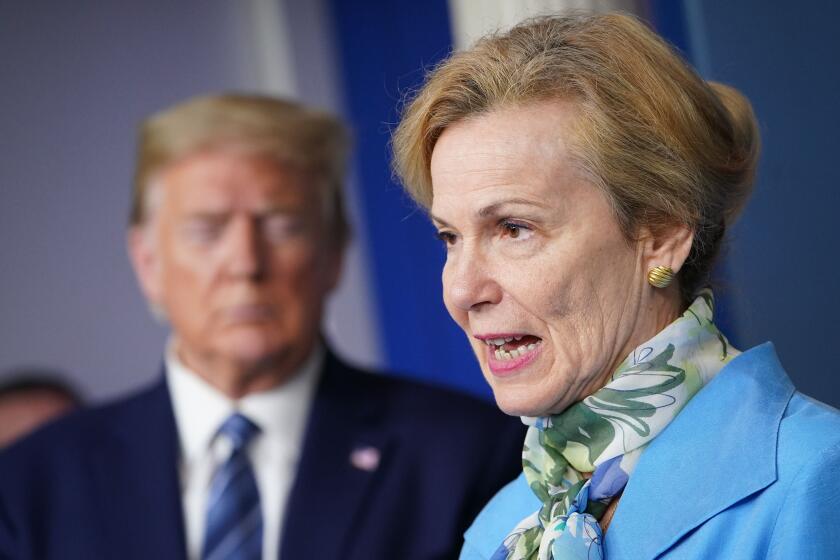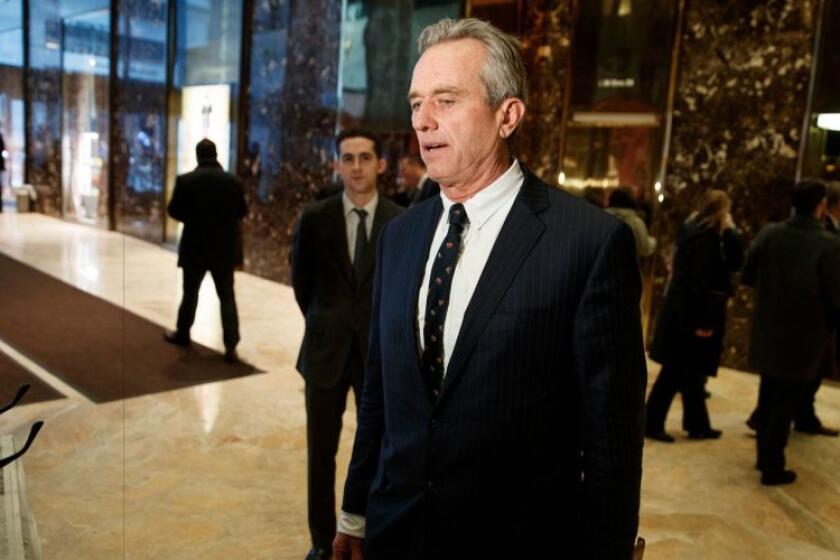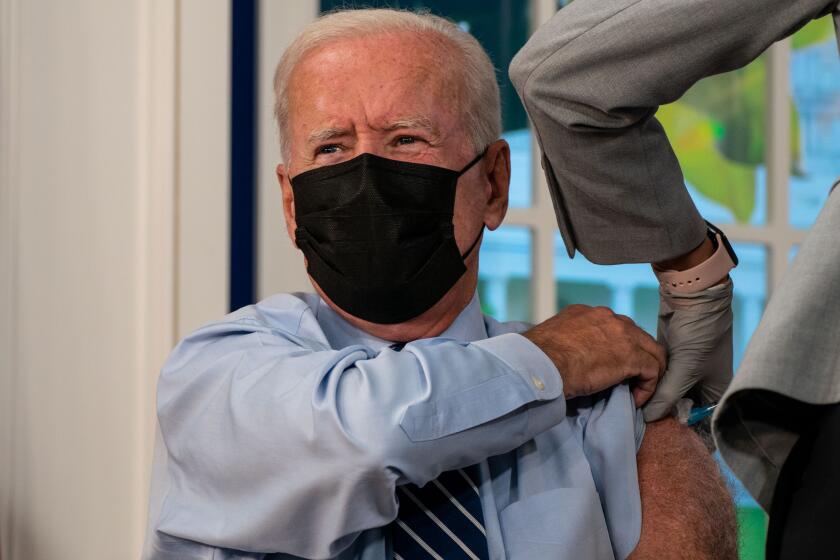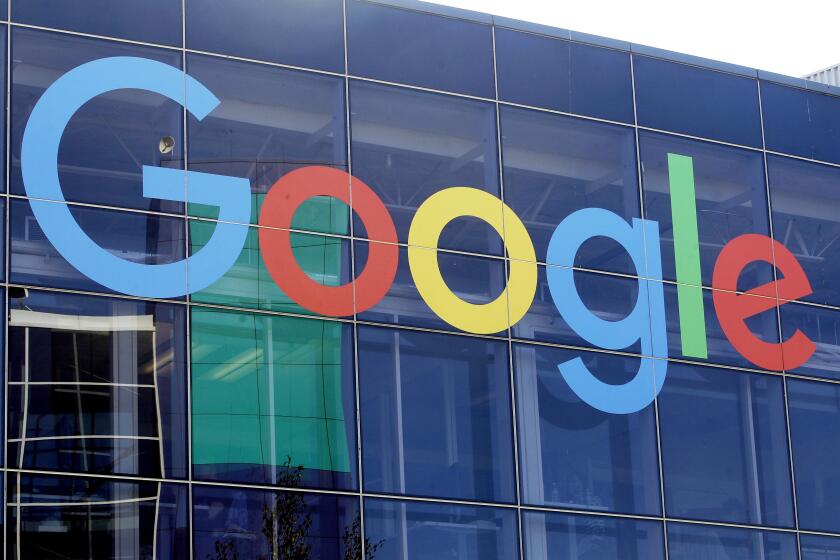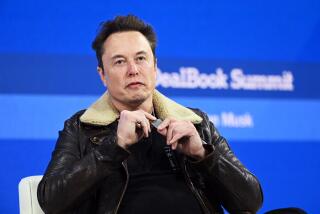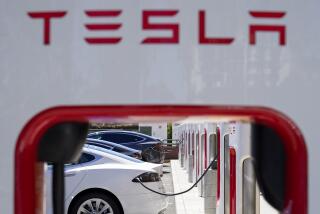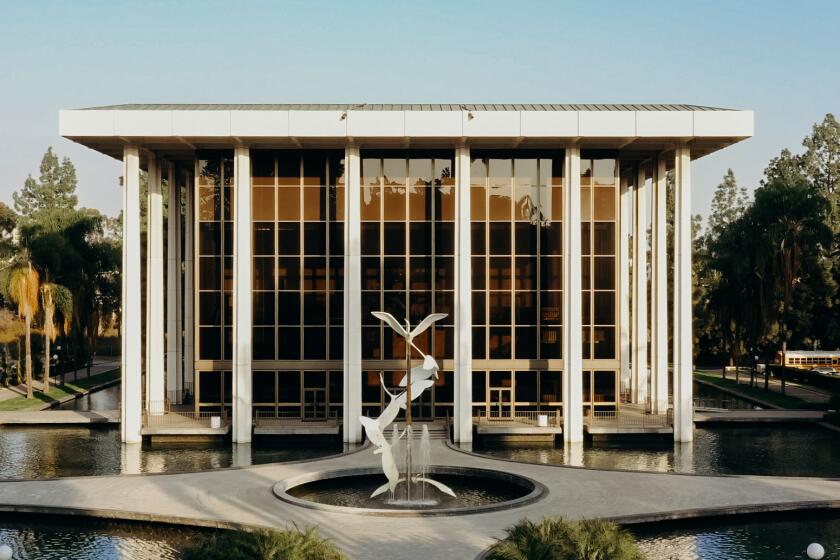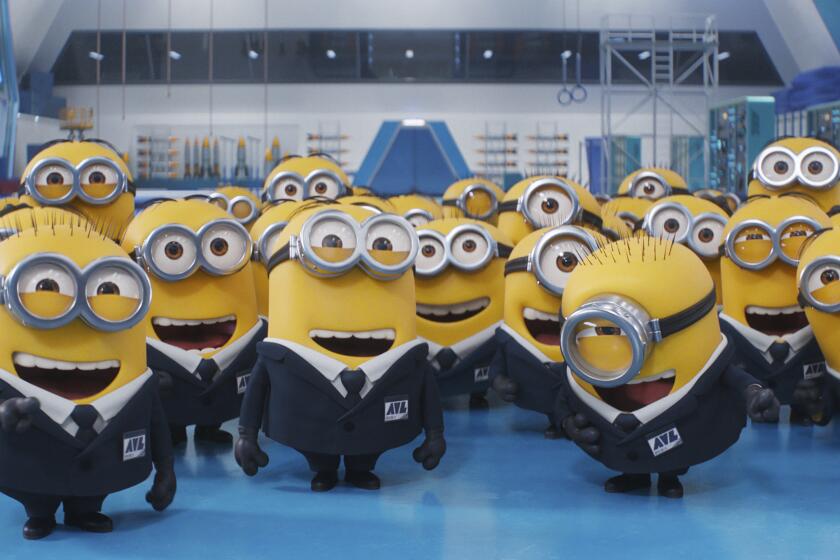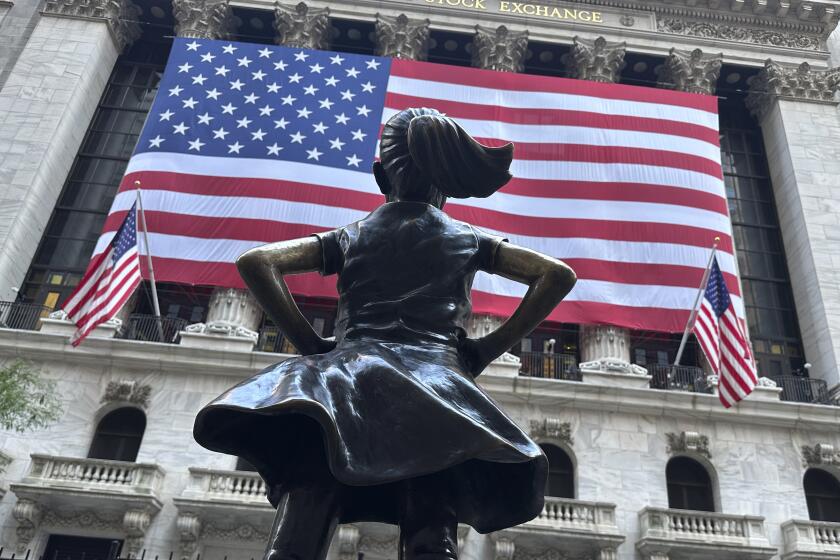Column: By embracing anti-Fauci and QAnon conspiracies, Musk tests how low Twitter can sink
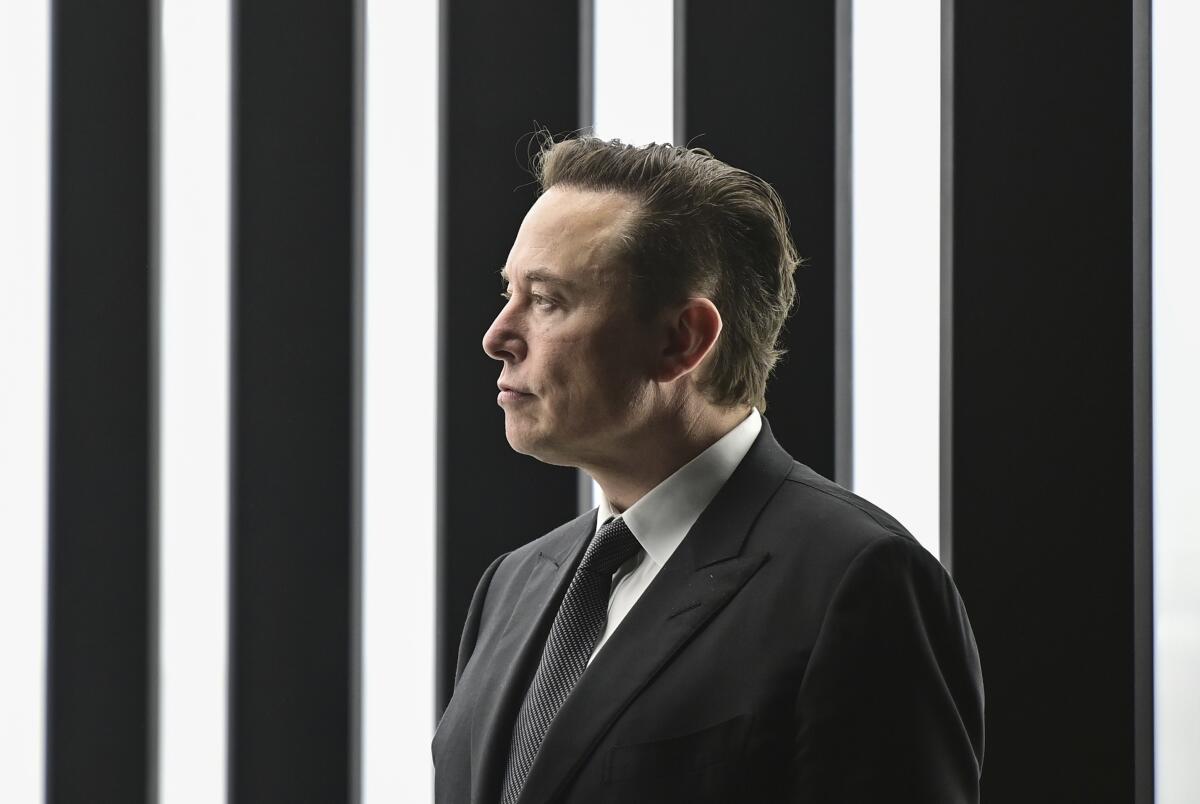
People trying to track the intellectual and moral deterioration of Twitter under its new owner, Elon Musk, have gotten a few more data points to work with in recent days.
On Sunday, Musk signed on to the right wing’s campaigns against Dr. Anthony Fauci, the highly respected infectious disease expert whose role in the battle against the HIV and COVID-19 viruses may have saved hundreds of thousands, if not millions, of lives.
“My pronouns are Prosecute/Fauci,” Musk tweeted Sunday.
Forcing your pronouns upon others when they didn’t ask...is neither good nor kind to anyone.
— Elon Musk
When former astronaut Scott Kelly (the twin brother of Democratic Sen. Mark Kelly of Arizona) upbraided Musk for not only attacking a “dedicated public servant” but mocking the practice among LGBTQ individuals and others of posting their preferred pronouns online and in emails, Musk doubled down.
“Forcing your pronouns upon others when they didn’t ask...is neither good nor kind to anyone,” he tweeted back. “As for Fauci, he lied to Congress and funded gain-of-function research that killed millions of people.”
Get the latest from Michael Hiltzik
Commentary on economics and more from a Pulitzer Prize winner.
You may occasionally receive promotional content from the Los Angeles Times.
Neither of those assertions about Fauci has been shown to be true, though they’re articles of faith among bloviating right-wingers such as Sen. Rand Paul (R-Ky.) and Florida Gov. Ron DeSantis.
The day before, Musk had falsely accused Yoel Roth, the former head of Twitter’s trust and safety team, of advocating allowing children to access adult material online. He did so by selectively and misleadingly quoting from Roth’s 2016 PhD thesis at the University of Pennsylvania.
The charge that gay individuals such as Roth are implicated in child sexual abuse is a homophobic slur out of the playbook of the conspiracy movement QAnon.
The claim has been picked up by far-right figures such as Rep. Marjorie Taylor Greene (R-Ga.), who used it against California state Sen. Scott Wiener (D-San Francisco), who is gay, posting a tweet calling him a “communist groomer” within days of getting her Twitter account restored by Musk.
Roth and his family have reportedly been forced to leave their home to avoid a torrent of threats and abuse following Musk’s tweet.
Scientists are using the coronavirus to study the contagion of misinformation
Musk also has bought into claims by opponents of broad-based public health policies aimed at combating the pandemic that they have been “censored” by social media platforms, including Twitter.
On Dec. 10 Musk met with Stanford medical professor Jay Bhattacharya, who has asserted in a federal lawsuit and on Twitter that the Biden administration coerced social media firms to “blacklist” him in violation of his 1st Amendment rights.
In a tweet following their meeting, Bhattacharya praised Musk for establishing a new Twitter “where transparency and free speech rule.” (He didn’t respond to my request for more details of the meeting.)
Musk’s latest outbursts have intensified questions about where he intends to lead Twitter, about how government regulators, lawmakers and the community of long-term Twitter users should respond, and about whether his behavior matters.
Gideon Lichfield, the editor in chief of Wired, argued Tuesday that the media’s Musk obsession distracts us from more important questions about “Twitter’s role in the world — its importance to natural-disaster management or to any number of communities for whom it’s a store of social wealth” in favor of a fixation on how much money the platform — that is, Musk — will lose.
Lichfield’s point was that the attention paid to Musk resembled that paid to Donald Trump‘s outrageous behavior during his presidency, which obscured the deeper damage Trump’s acolytes were doing to government policies and the rule of law.
Yet that won’t do. Musk has far more influence over Twitter than Trump had over the federal government. As Twitter’s undisputed owner, Musk gets no pushback from inside the platform.
California has made it illegal for doctors to disseminate harmful medical misinformation and disinformation. The right wing doesn’t like that.
His endorsements of conspiracy theories amplify those false narratives and give them credibility among many of his 120 million Twitter followers and 200 million-plus users, including the 13% of Americans who say they regularly get their news from Twitter.
Long-term observers of Musk and his businesses aren’t sure what he’s up to here. Tech reporter Kara Swisher speculates that he’s trying to create another right-wing media company to supplant a fading Fox News.
Conor Friedersdorf of the Atlantic argues that Musk’s inviting back onto Twitter a horde of twitterers whose accounts had been blocked for hatefulness or inciting violence or a host of other infringements of civil behavior had been unfairly disparaged by “alarmist” left-wing critics who ignored the amnesty’s “potential upsides,” such as making Twitter more trustworthy. (Good luck!)
Their conjectures may be plausible. But Musk’s behavior is indistinguishable at this moment from that of someone experiencing a personality meltdown and seeking succor from fringe communities willing to shower him with hero-worship because they also resent being treated as outcasts by the big, bad world.
Take Bhattacharya, for example. He’s one of the authors of the Great Barrington Declaration, a 2020 open letter that called for allowing the COVID-19 virus to run rampant among all but the most vulnerable members of society (such as the elderly and chronically ill) by keeping schools open and barring lockdowns, in the expectation of achieving “herd immunity,” a natural communal resistance to the disease.
Critics in the medical community call this notion “a dangerous fallacy unsupported by scientific evidence.” Indeed, it hasn’t worked in places that have tried it, including Sweden, where COVID case and death rates have far outstripped those of more cautious Nordic countries, Sweden’s nearest demographic neighbors.
The anti-vaccination movement grew stronger during the COVID pandemic. The result is a surge in measles and other preventable diseases.
Bhattacharya is joined in his lawsuit against the Biden administration by Martin Kulldorff, another co-author of the declaration, and a few other plaintiffs. As the writer Walker Bragman has pointed out, they’re represented by the New Civil Liberties Alliance, a right-wing litigation factory that has received funding from the Koch network. (The Alliance is also suing to block California’s new anti-medical misinformation law.)
In their lawsuit, Bhattacharya and his co-plaintiffs accuse the Biden White House, seven federal agencies and Fauci, among others, of staging one of the federal government’s greatest assaults on freedom of speech “in the nation’s history.”
They assert that the administration “subsidized, protected, and fostered the creation of speech-censorship policies in a small, concentrated group of social-media firms” through Section 230 of the Communications Decency Act of 1996, with the goal of suppressing the Great Barrington Declaration and other critiques of anti-pandemic policies.
Blaming the administration for social-media policies is plainly an effort to get around the fact that the 1st Amendment guaranteeing freedom of speech applies only to government entities, not private companies such as Twitter.
Section 230, as I’ve reported, is the legal provision that inoculates social media platforms, as well as newspapers and other enterprises that host outsiders’ content or images, from liability for the third-party content on their sites. Liability rests only with the actual content producers.
The lawsuit calls this a “unique liability shield,” but that’s false. The shield is exactly the same as the one enjoyed by bookstores and magazine stands, which can’t be sued over the content of the books and periodicals they sell.
Curiously, having blamed Section 230 for the censorship the plaintiffs claim to be suffering, the lawsuit then attacks the Biden administration for considering a repeal of Section 230. Its argument is that by threatening repeal, Biden is goading the social media platforms to impose greater censorship on Bhattacharya and Kulldorff.
The Supreme Court will review cases calling into doubt Section 230, which allows internet media platforms to function
One problem for the plaintiffs is that they can’t point to any specific cases in which the government forced social media firms to censor its critics. They largely refer to efforts by government officials to present the private firms with facts to counter critics’ misinformation, but nothing further.
Indeed, in a declaration filed with the lawsuit, Bhattacharya asserts that in October 2020, Francis Collins, then director of the National Institutes of Health, called for a “quick and devastating published take down” of the declaration’s premises in an email to Fauci.
But as Bhattacharya admits, no such “published take down” ever appeared. Instead, he claims, “covert” censorship took place. (Anyway, the president in October 2020 was Trump, not Biden.)
Musk has been trying to lend credibility to these claims by releasing internal files detailing efforts by Roth and other pre-Musk Twitter executives to deal with the tide of misinformation and disinformation inundating Twitter.
As the documents show, their efforts were not invariably successful — and sometimes may have gone too far — but at least they were trying.
That doesn’t appear to be true of Musk-era Twitter. On Monday, Musk abruptly dissolved the platform’s independent Trust and Safety Council, which advised executives on moderation policies.
On Tuesday, the watchdog group Media Matters for America and the LGBTQ advocacy organization GLAAD reported that the anti-LGBTQ slur “groomers” has soared since Musk’s takeover, with right-wing and anti-LGBTQ accounts he restored accounting for a huge share of the increase.
Musk may defend his lenience toward hatefulness as a victory for free speech, but the question is: Free speech for whom? Those who have tried to craft effective online moderation policies do so because noxious and vicious attacks and invective don’t encourage more open discussion, but drive thoughtful participants out of the discussion.
If Musk continues down this road, Twitter won’t be a beacon of free speech, but a miasmic, malodorous swamp. There’s no point trying to ignore his influence, because Twitter is all him. His promotion of lies and attacks on innocent people won’t be good for Twitter or anyone who truly values free speech.
How much lower can Musk’s Twitter sink? Those who argue that Musk is striving to remake the platform into a successful business seem confident that he knows something we don’t know. The question is: Do we want to know?
More to Read
Get the latest from Michael Hiltzik
Commentary on economics and more from a Pulitzer Prize winner.
You may occasionally receive promotional content from the Los Angeles Times.
